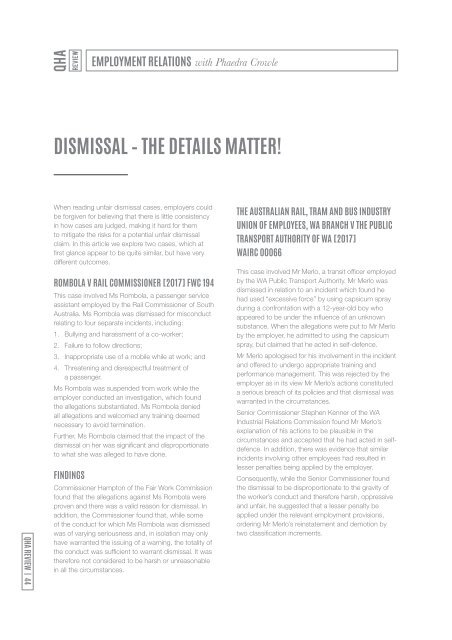QHA November 2017
You also want an ePaper? Increase the reach of your titles
YUMPU automatically turns print PDFs into web optimized ePapers that Google loves.
EMPLOYMENT RELATIONS with Phaedra Crowle<br />
DISMISSAL – THE DETAILS MATTER!<br />
<strong>QHA</strong> REVIEW | 44<br />
When reading unfair dismissal cases, employers could<br />
be forgiven for believing that there is little consistency<br />
in how cases are judged, making it hard for them<br />
to mitigate the risks for a potential unfair dismissal<br />
claim. In this article we explore two cases, which at<br />
first glance appear to be quite similar, but have very<br />
different outcomes.<br />
ROMBOLA V RAIL COMMISSIONER [<strong>2017</strong>] FWC 194<br />
This case involved Ms Rombola, a passenger service<br />
assistant employed by the Rail Commissioner of South<br />
Australia. Ms Rombola was dismissed for misconduct<br />
relating to four separate incidents, including:<br />
1. Bullying and harassment of a co-worker;<br />
2. Failure to follow directions;<br />
3. Inappropriate use of a mobile while at work; and<br />
4. Threatening and disrespectful treatment of<br />
a passenger.<br />
Ms Rombola was suspended from work while the<br />
employer conducted an investigation, which found<br />
the allegations substantiated. Ms Rombola denied<br />
all allegations and welcomed any training deemed<br />
necessary to avoid termination.<br />
Further, Ms Rombola claimed that the impact of the<br />
dismissal on her was significant and disproportionate<br />
to what she was alleged to have done.<br />
FINDINGS<br />
Commissioner Hampton of the Fair Work Commission<br />
found that the allegations against Ms Rombola were<br />
proven and there was a valid reason for dismissal. In<br />
addition, the Commissioner found that, while some<br />
of the conduct for which Ms Rombola was dismissed<br />
was of varying seriousness and, in isolation may only<br />
have warranted the issuing of a warning, the totality of<br />
the conduct was sufficient to warrant dismissal. It was<br />
therefore not considered to be harsh or unreasonable<br />
in all the circumstances.<br />
THE AUSTRALIAN RAIL, TRAM AND BUS INDUSTRY<br />
UNION OF EMPLOYEES, WA BRANCH V THE PUBLIC<br />
TRANSPORT AUTHORITY OF WA [<strong>2017</strong>]<br />
WAIRC 00066<br />
This case involved Mr Merlo, a transit officer employed<br />
by the WA Public Transport Authority. Mr Merlo was<br />
dismissed in relation to an incident which found he<br />
had used “excessive force” by using capsicum spray<br />
during a confrontation with a 12-year-old boy who<br />
appeared to be under the influence of an unknown<br />
substance. When the allegations were put to Mr Merlo<br />
by the employer, he admitted to using the capsicum<br />
spray, but claimed that he acted in self-defence.<br />
Mr Merlo apologised for his involvement in the incident<br />
and offered to undergo appropriate training and<br />
performance management. This was rejected by the<br />
employer as in its view Mr Merlo’s actions constituted<br />
a serious breach of its policies and that dismissal was<br />
warranted in the circumstances.<br />
Senior Commissioner Stephen Kenner of the WA<br />
Industrial Relations Commission found Mr Merlo’s<br />
explanation of his actions to be plausible in the<br />
circumstances and accepted that he had acted in selfdefence.<br />
In addition, there was evidence that similar<br />
incidents involving other employees had resulted in<br />
lesser penalties being applied by the employer.<br />
Consequently, while the Senior Commissioner found<br />
the dismissal to be disproportionate to the gravity of<br />
the worker’s conduct and therefore harsh, oppressive<br />
and unfair, he suggested that a lesser penalty be<br />
applied under the relevant employment provisions,<br />
ordering Mr Merlo’s reinstatement and demotion by<br />
two classification increments.

















